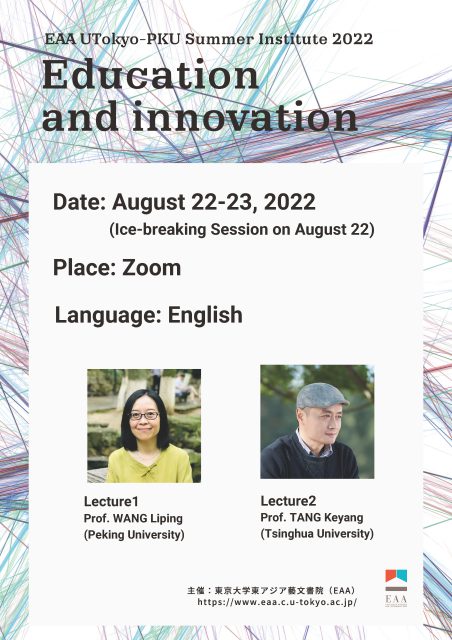The requirements are as follows.
Overview of the Program:
The theme of this program is “Education and innovation”
Participating students shall take part in the following programs.
1. Lectures by faculty members of PKU (in English)
2. 10 participating students from each university will be divided into groups for discussions, and will make a presentation of their achievements.
Eligibility:
1. Candidates must be enrolled as full-time undergraduate students and graduate school students
2. Proficiency in English is required to follow courses and conduct research in an English-speaking environment.
3. Some proficiency in Japanese is required for preparation activities prior to the program.
Duration:
Monday, 22nd August to Tuesday, 23rd August, 2022
Place: Zoom
Call for a few students
How to Apply:
Please apply from the entry form the entry form below.
2022 EAA Summer Institute Entry Form
Deadline:
9:00 am on Monday, July 11th, 2022
All applications will be screened, and selected candidates will be invited for an online interview. Details for interviews are to be announced.
Important Notes
* Students will be required to submit a report upon completion of the program regardless of their intention to earn credits.
* The submission of recording consent form: the student participants are asked to consent to the use of any recordings (video, audio, or photos) to EAA’s purpose.
* In addition to full-day participation and report submission, one credit can be earned by taking the “Praxis in East Asian Liberal Arts (6)” in the Senior Division of Faculty of Liberal Arts in the A semester.
[For inquiries:]
East Asian Academy for New Liberal Arts, The University of Tokyo(EAA)
E-mail: riewatanabe[at]eaa.c.u-tokyo.ac.jp Please replace [at] with (@)
https://www.eaa.c.u-tokyo.ac.jp/en/
Program (tentative)
Day 1 (Aug.22th) 11:00~12:00 (JST, 10:00~11:00 CST)Ice-breaking Session
14:00~17:00 (JST, 13:00~16:00 CST) Lecture1 by Prof. WANG Liping(Peking Univ.), Lecture 2 by Prof. TENG Keyang(Tsinghua Univ.)
Lecture 1
John Dewey heralded the movement of American progressivism and his thoughts inspired the direction of education development in the entire 20th century. His educational experiment was conducted in the same era when the famous sociologist Max Weber had his American journey. This paper aims at explaining the core idea of interest, which was formed at the inception of Dewey’s famous Laboratory School. In his later years, Dewey continuously revisited this concept, which became a key to understanding his thought about the relationship between the individual, society, culture and civilization. Dewey’s idea of interest is explicated through three levels: the distinction between interest and pleasure, the relationship between interest and will in the structure of action, and the unfolding of interest in children’s daily work. Elucidating these aspects helps us understand Dewey’s central position in the progressivist movement and pragmatist tradition. Dewey’s thought leads to a novel interpretation of “progress” in modern society, which pinpoints an actor, who creates the meaning of action rather than taking it over from the established cultural traditions.
References:
Dewey, John. 1944. Democracy and Education. New York: The Free Press.
Dewey, John. 1903. “Interest as Related to Will.” In Herbart Yearbook for 1895, edited by Charles A. McMurry. The University of Chicago Press.
Lecture 2
Space does not equal to grand buildings but is a general (and modern) reference to the habitat, either man-made or natural, abstract or materialized, in which humanity finds itself actualized. As a key category it has attracted attention of the researchers from many disciplines such as archaeologists, anthropologists, behavioral scientists, urban planners, among others,spurring the later “spatial turn” in the field of history.
Accordingly, sociologists develop their theory of everyday practices and make us reflect on the foundation of modern society. These familiar aspects of our life – housekeeping, shopping, recreation, city strolling – often distance themselves from Classical teaching and bring in the significant issue of what the ultimate goals of civilizations are. Scholars argue about the holistic “essence” of daily life but practitioners, not only architects but also plumbers, firefighters… are more interested in the formation and way of operations of the living environments.
Tang Keyang focuses on city and space from an interdisciplinary perspective, conducting research at the intersection of visual-psychology-behavior and on innovation practice with roots in traditional culture and daily life. The presenter will explore the seemingly contradictory combination of concepts that are “daily space” and “innovation”, expounding the fundamental source of design methodology in the context of a gradually more “virtual” reality. Possessing multiple roles including architect and architectural writer,
Tang Keyang will introduce us to the broader journey of space “innovation”, and help us make sense of the general significance of architecture in human life and our way of thinking.
References:
Michel de Certeau, Practice of Everyday Life, University of California Press, 2011.
Fei Xiaotong, From the Soil: The Foundations of Chinese Society, University of California Press,1992.
Kevin Lynch, The Image of the City (Harvard-MIT Joint Center for Urban Studies Series), The MIT Press, 1960.
Louis I. Kahn, Alessandro Vassella ed., Silence and Light: The Lecture at ETH Zurich, February 12, 1969, Park Books, 2013.
Frank Moss, The Sorcerers and Their Apprentices: How the Digital Magicians of the MIT Media Lab Are Creating the Innovative Technologies, Currency, 2011.
Day 2 (Sep.7th) 14:00~17:00 (JST, 13:00~16:00 CST)Group Presentation


Call for Applications (AY2023)







